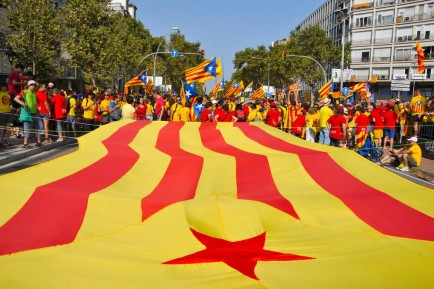
The push for independence in Catalonia is still strong, but there have been some recent wobbles.
Catalonia’s desire to secede from the rest of Spain is well known. What is less well known, however, is the uncomfortable fact that not every Catalan is on board with the urge to breakaway, and the numbers of anti-independence individuals in Catalonia have increased as Spain’s wider economy has improved…
And now there appears to be further division within the ranks of the Catalan pro-sovereignty movement following the dismissal this week of a minister who suggested the planned October 1 referendum will be unlikely to go ahead.
Jordi Baiget, who is Catalonia’s Minister for Business and Knowledge, was sacked by Catalan President Carles Puigdemont after suggesting on Monday that fierce opposition to Catalonia’s referendum by the Spanish government would likely force the cancellation of the planned referendum.
Deviating from the official party line, Baiget said in a TV interview that “the Spanish state is so strong that we probably won’t be able to hold the referendum”.
This stance was deemed unacceptable by Puigdemont, who is ploughing ahead with what he believes will be a “binding, unilateral independence poll” in Autumn, despite Spanish Prime Minister Mariano Rajoy consistently stating that any referendum result would be ignored, and even the scheduling of such a vote could constitute a violation of Spain’s constitution.
The decision by Puigdemont to sack Baiget “wasn’t taken lightly”, the Catalan President said as criticism of the move rolled in from numerous sources. Joana Ortega, the former Catalan vice-president, rounded on Puigdemont, tweeting: “Those of us who put our necks on the line wanted everyone to be able to have a say, including Baiget…”, while former Catalan government spokesman Francesc Homs said that the decision “does not contribute to the project or make it better – just the opposite”.
Current speaker of the Catalan parliament Carme Forcadell has said that if October’s referendum is a ‘yes’ for independence, then the regional government would begin formal secession negotiations with the Spanish state.
“If there was a no vote, it would be respected and there would have to be fresh elections in Catalonia and the result will depend on the state of the society at the time,” she told the Guardian.
“If a majority express their will democratically, it cannot just be ignored,” Forcadell stressed.
Despite this, Madrid has remained staunchly unmoved on the issue, maintaining that no region – Catalonia or otherwise – can be the tail that wags the dog.
 en
en



 Vlaams-Nederlands
Vlaams-Nederlands
0 Comments
Leave a Comment
DISCLAIMER
The opinions and comments expressed by contributors to this Blog are theirs alone and do not necessarily reflect the views of VIVA Homes Under the Sun Ltd, any of its associated companies, or employees; nor is VIVA to be held responsible or accountable for the accuracy of any of the information supplied.
Have you got something to say?